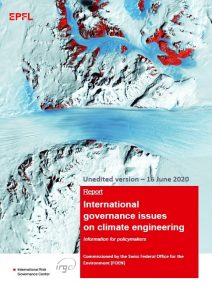A new report on the governance of climate geoengineering — that is, carbon dioxide removal (CDR) and solar geoengineering (or solar radiation modification, SRM) — has been released. International Governance Issues on Climate Engineering: Information for Policymakers was coordinated and issued by the International Risk Governance Center, edited by IRGC’s Marie-Valentine Florin, and commissioned by the …
Continue reading "A New Report on Governing Climate Geoengineering"
The post A New Report on Governing Climate Geoengineering appeared first on Legal Planet.
#thatis #carbondioxideremoval
A new report on the governance of climate geoengineering — that is, carbon dioxide removal (CDR) and solar geoengineering (or solar radiation modification, SRM) — has been released. International Governance Issues on Climate Engineering: Information for Policymakers was coordinated and issued by the International Risk Governance Center, edited by IRGC’s Marie-Valentine Florin, and commissioned by the Swiss Federal Office for the Environment. Its four chapters were individually authored: Paul Rouse (Carnegie Climate Governance Initiative) reviews the techniques; Anna-Maria Hubert (University of Calgary) describes the relevant international legal rules and institutions; Matthias Honegger (IASS Potsdam, Perspectives Climate Research, and Utrecht University) analyzes risks and and trade-offs in governance; and I evaluate options and approaches for future international governance. Today the Geneva Environment Network hosted a (online) launch event, whose video is available online.
Here I focus on the report’s recommendations. In the report, I make the reasoning for them explicit by offering three bases. One is the assessment criteria of governance options, which are guided by agreements and statements that most (if not all) countries have endorsed. The second foundation is options for sites of international governance. These are mostly intergovernmental institutions and are evaluated based on aspects such as core competence, expertise, function, how “political” or “scientific” the institution’s processes are, and the decision-making process. And third is potential substantive options, for which I cast a wide net to consider what governance could do.
The first recommendation is a general one that underlies the others: to distinguish between CDR and solar geoengineering as well as among the diverse CDR techniques in their additional dedicated governance. Combined as “climate engineering” or “geoengineering” usually causes more confusion than clarity, as their characteristics, opportunities, and risks differ substantially. Fortunately, this has been the trend in recent years, such as in the reports of the Intergovernmental Panel on Climate Change (IPCC).
Second is to accelerate authoritative, comprehensive, and international scientific assessment. Although CDR and solar geoengineering have been assessed, an authoritative international body should do so in order to advance the conversations. The preferred site for this is the IPCC, given its mandate, which should dedicate substantial effort especially toward solar geoengineering, for which the knowledge base remains relatively limited and the need for outdoor testing and experimentation seems to be an obstacle. One or two special reports may be the best way to accomplish this.
The third recommendation for future governance is that the international policy-making community should encourage the research, development, and responsible use of some CDR techniques. Specifically, the institutions associated with the UN Framework Convention on Climate Change should elevate CDR’s visibility in the climate change regime’s processes and activities; push for greater systematic consideration of parties’ obligations to pursue CDR, under the rubric of enhancements of sinks and reservoirs; and work toward realistic and viable financial incentive systems.
Fourth, states should help build capacity for evaluating CDR and solar geoengineering in some of those countries that lack the resources to do so. A broad, diverse set of states will need to engage in order for any international governance to be effective and perceived as legitimate, but many developing countries lack the capacity to develop their own positions on the issues in informed ways. Industrialized countries should launch programs to partner with developing ones, providing funding and academic partnerships that allow them to address their own research priorities and build their own expertise.
Fifth, states and intergovernmental institutions should facilitate the elaboration and implementation of non-state governance. In the absence of state action – often due to contestation and steep learning curves – non-state actors can further international governance, which can help prepare for state governance at a later stage. An ad hoc coalition of a few states and funders of climate change research could undertake this by, for example, convening discussions of respected scientists in related fields, research institutions, and professional societies.
The final recommendation is for international processes that explore potential further governance of solar geoengineering while remaining agnostic concerning its ultimate use. A lengthy societal dialogue is necessary, as it should begin as soon as possible. The primary purposes of the process would be to engage more numerous and diverse states, allow them and the relevant international institutions to learn about and develop the capacity to address solar geoengineering, establish common understandings, and to build trust.
I thank Marie-Valentine, others at IRGC, and my co-authors for their efforts. I am proud of the output, and encourage you to read it.
The post A New Report on Governing Climate Geoengineering appeared first on Legal Planet.
By: Jesse Reynolds
Title: A New Report on Governing Climate Geoengineering
Sourced From: legal-planet.org/2020/06/18/new-report-on-governing-climate-geoengineering/
Published Date: Thu, 18 Jun 2020 15:00:45 +0000
Vist Maida on Social Me
Website Links
Maida Law Firm - Auto Accident Attorneys of Houston, by fuseology

No comments:
Post a Comment